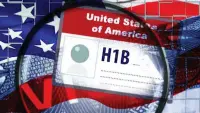September 22, 2025
H-1B workers currently abroad are racing to enter the US following a Trump administration order, creating confusion and uncertainty over visa rules, entry requirements, and employment timelines.

Thousands of H-1B visa holders working abroad are rushing to the United States in response to a recent Trump administration executive order affecting visa holders and temporary foreign workers. The directive, which includes travel restrictions and policy changes for non-immigrant visas, has sparked widespread dismay and confusion among skilled workers and multinational companies that rely on foreign talent.
Background on H-1B Program The H-1B visa program allows US companies to hire foreign workers in specialty occupations such as technology, engineering, healthcare, and finance. H-1B visas are critical for addressing talent shortages in sectors that require highly specialized skills. Many of these workers live and work outside the US while awaiting processing, transfers, or renewals.
Impact of the Trump Order The recent executive order has several implications:
Visa Restrictions: Potential limitations on visa issuance or entry could affect new and existing H-1B visa holders abroad.
Employer Uncertainty: Companies hiring foreign talent are facing operational disruptions as they assess how the order affects staffing and project timelines.
Worker Confusion: H-1B workers abroad are unsure about travel, status maintenance, and compliance requirements, prompting urgent travel decisions to secure their positions.
Immediate Response Many H-1B visa holders and their employers are now accelerating travel plans to ensure compliance with the new directives. Some are seeking legal guidance, while others are contacting US consulates and immigration attorneys to clarify entry requirements.
Economic and Sectoral Implications
Tech Industry: High demand for skilled IT professionals in Silicon Valley and other US tech hubs makes the H-1B workforce essential. Travel restrictions or delays could slow innovation and project timelines.
Healthcare and Research: Hospitals, research institutions, and universities relying on H-1B talent may experience staffing challenges if foreign professionals cannot enter on time.
Corporate Operations: Multinational companies dependent on cross-border assignments face uncertainty in maintaining project continuity and meeting contractual obligations.
Legal and Policy Considerations Immigration experts note that while the executive order aims to protect domestic jobs, it may have unintended consequences on US competitiveness, especially in sectors where domestic talent supply is insufficient. Legal challenges and appeals may arise if workers or companies argue that the order disrupts contractual obligations or existing visa agreements.
Future Outlook The situation remains fluid, with legal interpretations and administrative clarifications expected in the coming weeks. H-1B visa holders and employers must monitor US immigration updates, consular advisories, and potential court rulings to navigate the evolving landscape.
Conclusion The Trump administration order has created a sense of urgency among H-1B workers abroad, prompting a rush to the US and raising questions about the future of foreign talent in key industries. The move underscores the vulnerability of global workforce mobility to policy changes and highlights the importance of clear guidance for skilled foreign professionals.